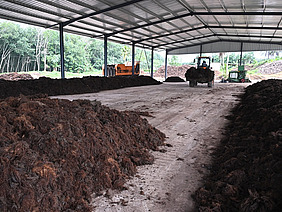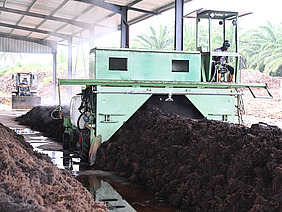Palm oil production generates significant volumes of waste, including empty fruit bunches (EFBs) and palm oil mill effluent (POME). Both residues can cause severe environmental contamination if not properly managed. Given that soils in tropical contexts are often poor in both structure and nutrient content, producing compost from industrial organic waste to supplement natural biomass inputs is a crucial practice for enhancing soil fertility, plant health, and crop yields.
FiBL videos showcase best practices for composting in palm plantations
Developed under the project "Recycling palm oil production residues by composting", funded by the platform REPIC (Renewable Energy, Energy and Resource Efficiency Promotion in Developing and Transition Countries) and Coop Switzerland, three newly published FiBL videos highlight best practices in industrial composting, as implemented by the project partner Plantation Modernes de Côte d'Ivoire (PMCI) in Kouakoukro, east of Abidjan, Côte d'Ivoire. This pilot site currently produces 900 metric tons of compost per year from EFBs and POME. Thanks to the acquired equipment and the infrastructure setin place, the composting site showcases the importance of waste upcycling in tropical contexts.
The first video showcases the application of compost in palm plantations, including clearing the land, spreading the compost, and incorporating it into the soil. The second video focuses on the valorisation of palm oil residues through composting at the pilot site and explains why it is a highly effective way to recycle these by-products. Lastly, the third video illustrates why a field laboratory is essential to ensure compost quality, effectiveness, and safety, thereby optimising the entire process.
Outlook: Enhancing sustainability with biochar
Altogether, these videos aim to convey the message that composting is a viable option for upcycling industrial organic waste. With a new project, equally supported by REPIC and Coop, FiBL and PMCI will complement this venture with an industrial biochar production unit to further enhance the sustainability of agricultural production in Côte d'Ivoire and showcase best practices for tropical contexts.
Further information
Contacts
Links
- youtube.com: Application of compost in a coconut or oil palm plantation (French with English subtitles)
- youtube.com: Valorisation of residues from palm oil production through composting (French with English subtitles)
- youtube.com: Field laboratory for quality assurance of the industrial composting process (French with English subtitles)
- fibl.org: The project "Recycling palm oil production residues by composting" in the FiBL project database





